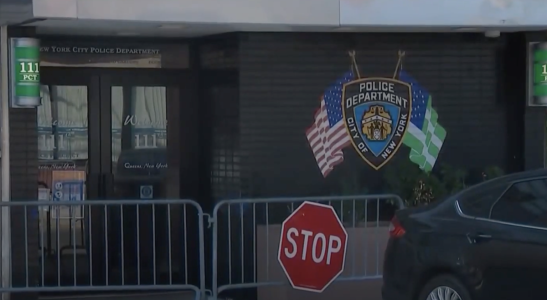Revealed: The secret infiltration—how an NYPD sergeant’s alleged "spying" sparks national security concerns
By
Veronica E.
- Replies 0
In the heart of New York City, where the NYPD stands as a symbol of protection and order, a shocking revelation has shaken the department.
A seasoned sergeant in the detective bureau is under investigation for allegedly spying on behalf of the Chinese government.
The allegations have raised serious questions—not just about the officer’s actions but about the broader implications for national security.
If proven true, this case could expose vulnerabilities within law enforcement and highlight the growing concerns over foreign influence in the US.

Sergeant Zhu Jiang, who worked in a specialized unit investigating healthcare fraud, has been suspended without pay as the FBI continues its probe.
Since joining the NYPD in 2013, Jiang has held key roles in various detective squads and even the organized crime investigative division.
Earning a salary of $169,000 last year, he was a trusted officer with access to sensitive information—making these allegations all the more alarming.
The details remain under investigation, but authorities suspect Jiang of engaging in espionage for the Chinese government.
The FBI’s involvement signals the severity of the case and the potential risks it poses to national security.
A law enforcement officer with access to privileged information allegedly working with a foreign government is a scenario that could have serious consequences.
This is not the first time an NYPD officer has been linked to similar concerns.
Last year, Lt. Steven Li was fired after allegedly assisting a Chinese official in an operation targeting individuals wanted by Beijing.
While Li was not officially declared a foreign agent, his case underscored the challenges law enforcement agencies face in preventing external influence.
Jiang’s situation only adds to the growing concerns about potential infiltration within US institutions.

The possibility that a law enforcement officer was gathering intelligence for a foreign government raises urgent questions.
How can agencies prevent security breaches? Are existing background checks and monitoring systems sufficient?
These concerns extend beyond this individual case—highlighting the ongoing challenge of safeguarding classified information and maintaining public trust.
In response to cases like this, agencies must continually reassess their security measures.
Strengthening background checks, monitoring potential conflicts of interest, and increasing awareness about foreign influence are all critical steps in preventing future incidents.
The NYPD, along with national security agencies, faces the task of ensuring its ranks remain beyond reproach.
This case also sheds light on the evolving nature of espionage.
In today’s digital world, sensitive information is not just passed through physical meetings—it can be transferred with a single click.
As cyber threats grow, the challenge is not just keeping classified files secure but also preventing digital leaks and foreign influence campaigns.
Read next: Is your privacy at risk? The FBI warns about a new spy campaign targeting everyday devices

With national security concerns becoming more complex, discussions like this matter. How do you think agencies can better protect sensitive information? What steps should be taken to prevent foreign interference? Share your thoughts in the comments below and be part of this important conversation.
A seasoned sergeant in the detective bureau is under investigation for allegedly spying on behalf of the Chinese government.
The allegations have raised serious questions—not just about the officer’s actions but about the broader implications for national security.
If proven true, this case could expose vulnerabilities within law enforcement and highlight the growing concerns over foreign influence in the US.

A shocking case unfolds: An NYPD sergeant faces allegations of espionage, raising concerns about national security. Image Source: YouTube / NBC New York.
The accused: Sergeant Zhu Jiang’s suspended career
Sergeant Zhu Jiang, who worked in a specialized unit investigating healthcare fraud, has been suspended without pay as the FBI continues its probe.
Since joining the NYPD in 2013, Jiang has held key roles in various detective squads and even the organized crime investigative division.
Earning a salary of $169,000 last year, he was a trusted officer with access to sensitive information—making these allegations all the more alarming.
The allegations: Espionage on behalf of China
The details remain under investigation, but authorities suspect Jiang of engaging in espionage for the Chinese government.
The FBI’s involvement signals the severity of the case and the potential risks it poses to national security.
A law enforcement officer with access to privileged information allegedly working with a foreign government is a scenario that could have serious consequences.
Also read: Hackers could be tracking you RIGHT NOW through your phone—protect yourself with these essential steps!
The context: A pattern of suspicion
This is not the first time an NYPD officer has been linked to similar concerns.
Last year, Lt. Steven Li was fired after allegedly assisting a Chinese official in an operation targeting individuals wanted by Beijing.
While Li was not officially declared a foreign agent, his case underscored the challenges law enforcement agencies face in preventing external influence.
Jiang’s situation only adds to the growing concerns about potential infiltration within US institutions.

Sergeant Zhu Jiang, now suspended, is under investigation for alleged espionage, sparking national security concerns. Image Source: The Daily Mail.
The impact: National security at stake
The possibility that a law enforcement officer was gathering intelligence for a foreign government raises urgent questions.
How can agencies prevent security breaches? Are existing background checks and monitoring systems sufficient?
These concerns extend beyond this individual case—highlighting the ongoing challenge of safeguarding classified information and maintaining public trust.
Also read: Exposed: Chinese hackers allegedly target 8 US telecom giants, says US official
The response: Strengthening internal security
In response to cases like this, agencies must continually reassess their security measures.
Strengthening background checks, monitoring potential conflicts of interest, and increasing awareness about foreign influence are all critical steps in preventing future incidents.
The NYPD, along with national security agencies, faces the task of ensuring its ranks remain beyond reproach.
This case also sheds light on the evolving nature of espionage.
In today’s digital world, sensitive information is not just passed through physical meetings—it can be transferred with a single click.
As cyber threats grow, the challenge is not just keeping classified files secure but also preventing digital leaks and foreign influence campaigns.
Read next: Is your privacy at risk? The FBI warns about a new spy campaign targeting everyday devices
Key Takeaways
- An NYPD sergeant is under FBI investigation for allegedly spying for the Chinese government.
- Sergeant Zhu Jiang has been suspended without pay and is fluent in the Fuzhou dialect of Chinese.
- Jiang has not been charged or taken into custody, but he is the second NYPD officer suspected of espionage for China in less than a year.
- This case follows a similar incident involving former NYPD Lt. Steven Li, who was fired last year for related misconduct.
With national security concerns becoming more complex, discussions like this matter. How do you think agencies can better protect sensitive information? What steps should be taken to prevent foreign interference? Share your thoughts in the comments below and be part of this important conversation.






